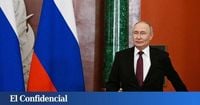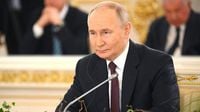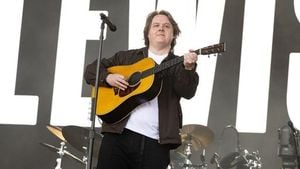In a significant diplomatic development, Russian President Vladimir Putin has extended an invitation for direct negotiations with Ukraine, scheduled for May 15, 2025, in Istanbul. This proposal comes in response to mounting pressure from European leaders who recently convened in Kyiv, demanding an unconditional 30-day ceasefire from Moscow.
The meeting in Kyiv on May 10, 2025, included leaders from the United Kingdom, Germany, France, and Poland, who urged President Volodymyr Zelenski of Ukraine to push for a truce that would allow for peace discussions. They emphasized the need for immediate action, threatening further sanctions against Russia should it refuse to comply with their demands.
Putin's announcement, made during a late-night press conference from the Kremlin, did not directly address the proposed ceasefire. Instead, he framed the upcoming talks as an opportunity to discuss the "root causes of the conflict" and work towards a lasting peace. "We are determined to have serious negotiations to eliminate the roots of the conflict and establish a durable peace," Putin stated, underscoring his commitment to the discussions.
During his remarks, Putin reiterated his stance that Russia did not terminate negotiations in 2022, asserting that it was Ukraine that walked away from talks shortly after the onset of the military campaign. He noted, "It was not Russia that broke off the negotiations in 2022. It was Kyiv. However, we propose that Kyiv resume direct negotiations without any preconditions." This statement highlights the ongoing tension and mistrust that has characterized the conflict.
Amid these developments, Putin also made accusations against the Ukrainian government, claiming that they attempted to disrupt the recent 80th-anniversary celebrations of the end of World War II in Moscow. He accused Ukraine of launching attacks during a previous ceasefire, saying, "During the three-day ceasefire, Ukraine attempted to attack the Russian borders, attacks that were repelled." This rhetoric serves to further complicate the already fraught relationship between the two nations.
As the clock ticks down to the proposed negotiations, Putin plans to engage with Turkish President Recep Tayyip Erdogan to facilitate the talks in Istanbul. Erdogan has previously positioned Turkey as a mediator in the conflict, and his involvement may be crucial in ensuring that the discussions proceed smoothly.
European leaders, particularly French President Emmanuel Macron, have been vocal in their demands for a ceasefire. Macron stated that achieving a 30-day peace would allow for discussions leading to a more permanent resolution. He warned that failure to agree to a truce could result in "much tougher" sanctions against Russia, aimed at pressuring the Kremlin to reconsider its position.
British Prime Minister Keir Starmer echoed these sentiments, criticizing Putin for using tactics that obscure genuine efforts for peace. He remarked, "If he is serious about peace, he has the opportunity to demonstrate it now by extending the Victory Day pause into a full and unconditional ceasefire for 30 days, with negotiations to follow immediately." Starmer's comments reflect a growing frustration among Western leaders regarding Russia's commitment to peace.
Despite the rhetoric surrounding the proposed ceasefire, Putin's refusal to accept the 30-day truce raises questions about the viability of the upcoming negotiations. He has insisted that the Ukrainian military has previously violated ceasefires, including a recent 72-hour truce announced to coincide with the Victory Day celebrations. Putin claimed that Ukrainian forces attempted to penetrate Russian territory during these periods, further complicating the narrative of blame.
As the situation develops, the international community watches closely. The outcome of the proposed negotiations in Istanbul could have significant implications for the ongoing conflict and the geopolitical landscape in Eastern Europe. The potential for a renewed dialogue is fraught with uncertainty, yet it also offers a glimmer of hope for a resolution to the hostilities that have persisted for over three years.
In conclusion, while the invitation for talks in Istanbul marks a pivotal moment, the path to peace remains uncertain. The forthcoming discussions will test the resolve of both parties and their willingness to engage in a meaningful dialogue aimed at ending the conflict.





